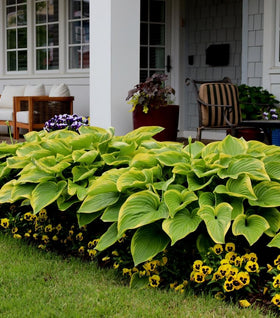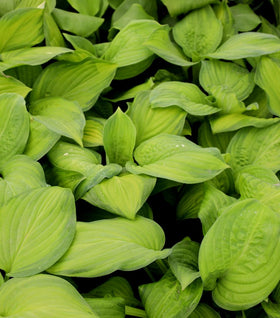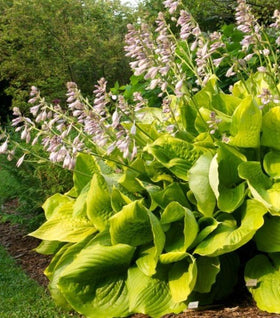Hosta Plants for Sale Online
Hostas are a wonderful choice for almost every garden, mostly because of their versatility. Hostas are available in a wide variety of shapes, colors and forms to suit every purpose, whether you’re looking for a border plant, container specimen or mass planting subject.
Their broad leaves create an ideal backdrop for more colorful plants but are interesting enough to be focal points themselves. These characteristics make them a great pairing choice for a variety of plants, from astilbe perennials to ferns.
Types of Hosta Plants
Hostas are originally from Asia but have long been favored throughout the world. Today, thousands of cultivars exist, varying widely in shape, size, color, and texture. Most, however, share similar broad leaves and rounded growing habits.
Garden Goods Direct offers several varieties of shade-loving Hostas for sale:
- The dark green Blue Angel
- The bright green Sum and Substance
- The avocado-colored Guacamole
- The variegated Frances Williams
- The white-margined Patriot and Albomargi
Each variety has its own unique characteristics and colorations, so be sure to read more about each variety before selecting one.
Why Plant Hosta Plants?
Hostas are a wonderful choice for almost every garden, mostly because of their versatility. Hostas are available in a wide variety of shapes, colors, and forms to suit every purpose, whether you’re looking for a border plant, container specimen, or mass planting subject. Their broad leaves create an ideal backdrop for more colorful plants but are interesting enough to be focal points themselves. These characteristics make them a great pairing choice for a variety of plants, from astilbe perennials to ferns.
On top of these benefits, hostas are quite utilitarian. Easy to grow and surprisingly hardy, hostas can do well in a variety of light, soil, and moisture conditions with little maintenance, making them a smart choice for beginning gardeners.
Tips for Choosing the Right Variety of Hosta Shade Perennials
The most key factor to consider when choosing a hosta for your garden is location. Hostas vary widely in their climate needs, with some tolerating only USDA Growing Zones 6 through 11, while others tolerate zones 3 through 8. Always check to see that the variety you like is suitable for your area before purchase, or else your hosta may not survive.
It’s also important to pick a location within your garden that’s suitable for your hosta. All Hostas need some shade, but varieties with lighter foliage need slightly more light than their darker-colored counterparts. Keep this in mind when selecting an area to plant.
Beyond these locational considerations, you can largely choose the variety of hosta you like best.
How to Care for Hosta Perennials
Hosta care is easy, provided you know how to plant hosta shade perennials. First, make sure the location is right, with the right amount of sun and soil that is rich, moist, and well-drained. If your soil is less than ideal, you can amend it with local compost or fertilizer. Once planted, add mulch around the base of your hosta to help retain moisture, and water regularly until it’s established.
Once planted, hosta plants are very easy to care for. Fertilize them each spring for the best results, and water them regularly during drier times of the year. Keep an eye out for deer foraging and slugs, as both can mar your hosta leaves.
What Should I Plant Next To My Hosta Plants?
Hostas grow well with woodland ferns, dicentra exima, and geraniums. Virtually any shade-tolerant plant can be companion planted with hostas just be sure to not place taller plants in front of hastas so you can enjoy the colorful foliage and interesting flowers.
Are Deer Attracted To Hosta Plants?
Deer are extremely attracted to Hosta plants. It is critical that you keep these animals far away from your garden and extremely far away from your Hostas. If deer get ahold of this plant, they will eat it all up and destroy it. However, this perennial is resistant to rabbits. As long as your Hosta is in an area of your garden that is not too close to deer, you should not have to worry about them being eaten and permanently damaged.










